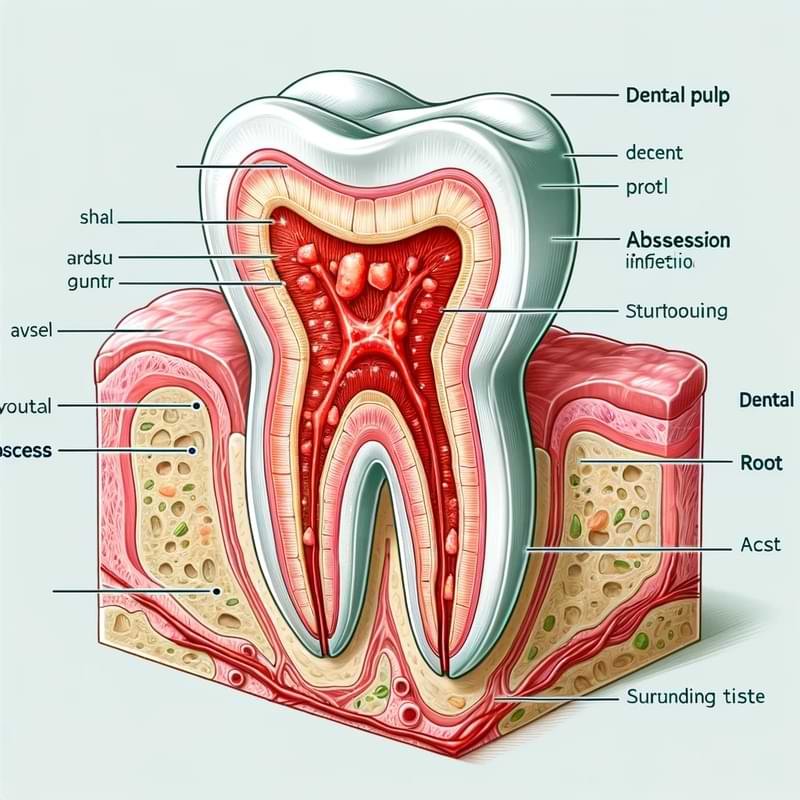Introduction
Tooth infections are a common dental problem that, if left untreated, can lead to severe and potentially life-threatening complications. Understanding the progression, symptoms, and treatment options is crucial for managing the risks associated with these infections.
Understanding Tooth Infections
A tooth infection, or dental abscess, occurs when bacteria invade the dental pulp — the innermost part of the tooth that contains nerves and blood vessels. Typically, these infections are caused by severe decay, injury, or previous dental work. They can manifest as periapical abscesses at the tip of the tooth’s root, or periodontal abscesses which occur in the gums at the side of a tooth root.
Symptoms of a Tooth Infection
The symptoms of a tooth infection include severe, persistent, throbbing toothache, sensitivity to hot and cold temperatures, fever, swelling in your face or cheek, tender, swollen lymph nodes under your jaw or in your neck, sudden rush of foul-smelling and foul-tasting, salty fluid in your mouth and pain relief if the abscess ruptures, difficulty breathing or swallowing.
Progression of Untreated Tooth Infections
If a tooth infection is left untreated, the bacteria can spread out from the root of the tooth and into the surrounding bones and tissues. This can lead to a worsening of the local infection, causing increased pain and swelling. Eventually, the bacteria can enter the bloodstream, leading to septicemia or sepsis, a potentially life-threatening condition.
How Tooth Infections Spread
The spread of infection from a tooth can follow several pathways: through the bone, the bloodstream, or the lymphatic system. Once spread, it can cause secondary infections in the sinuses, jaw, other parts of the mouth, and even distant organs.

Systemic Impact of Tooth Infections
The systemic impact of tooth infections can be profound. Sepsis, a body-wide response to infection, can develop and lead to organ failure and death if not promptly treated. Other complications can include Ludwig’s Angina, a skin infection that can obstruct the airways, and cavernous sinus thrombosis, a rare form of blood clot.
Case Studies: Severe Outcomes of Tooth Infections
Historical cases have shown that tooth infections, if not addressed timely, have led to hospitalizations, long-term health issues, and even fatalities. These cases underline the critical nature of recognizing symptoms early and seeking immediate dental care.
Treatment Options for Tooth Infections
Treatment for tooth infections may involve antibiotics to combat the infection, drainage of the abscess, root canal treatment, or extraction of the infected tooth. The choice of treatment depends on the severity of the infection and the affected tooth.
Preventing Tooth Infections
Preventive measures include maintaining good oral hygiene, regular dental check-ups, avoiding sugary snacks between meals, and promptly treating cavities and other dental issues before they lead to an infection.
When to Seek Medical Help
Immediate medical attention should be sought if you experience severe pain that does not subside with over-the-counter pain relievers, fever, swelling, or any signs of spreading infection such as swelling of the face or neck, difficulty breathing, or swallowing.
The Role of Dental Care in Managing Infections
Regular dental visits are vital for early detection and management of tooth decay and damage, which are primary causes of tooth infections. Dentists can provide proactive treatments that may prevent the development of an abscess.
Conclusion
While a tooth infection can become life-threatening if ignored, timely and effective treatment can prevent serious complications. Recognizing the symptoms and understanding the importance of immediate dental care can save lives. Always consult with a dental professional if you suspect a tooth infection to prevent any serious health issues.
This article offers comprehensive insights into the seriousness of tooth infections and stresses the importance of immediate medical intervention.
Read More: Key Warning Signs After Ankle Surgery: What To Monitor For Safe Recovery
FAQs
Q1: How quickly can a tooth infection become serious? A1: The severity and spread of a tooth infection can escalate quickly, sometimes within days, if not treated. Symptoms like severe pain, fever, and swelling can indicate that the infection is spreading.
Q2: Can a tooth infection lead to death? A2: Yes, in severe cases, a tooth infection can spread and lead to life-threatening conditions such as sepsis. It is crucial to seek immediate medical attention if you experience signs of a spreading infection.
Q3: What are the signs that a tooth infection is spreading? A3: Signs include severe pain that doesn’t subside with over-the-counter medications, visible swelling, fever, and difficulties in breathing or swallowing.
Q4: How is a tooth infection treated? A4: Treatment typically involves antibiotics to fight the infection, drainage of the abscess, and possibly a root canal or tooth extraction, depending on the severity.
Q5: Can I prevent tooth infections? A5: Yes, good oral hygiene practices, such as regular brushing and flossing, reducing sugar intake, and routine dental check-ups, can significantly reduce the risk of developing tooth infections.



